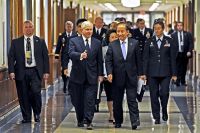WASHINGTON, Oct. 8, 2010 — The United States and South Korea are ready to counter any instability caused by a leadership succession in North Korea, Defense Secretary Robert M. Gates and his South Korean counterpart said here today.
Gates and National Defense Minister Kim Tae-young participated in the 42nd Security Consultative Meeting, after which they told reporters that the U.S.-South Korea military alliance has never been stronger.
The news that ailing North Korean leader Kim Jong-il has anointed his son, Kim Jong-un, as his successor has the alliance preparing to defend against all possible North Korean threats.
“When Kim Jong-il’s health may deteriorate or if there is a movement of public opinion in North Korea, we cannot eliminate the possibility that there will be an instability situation in North Korea,” Kim said through an interpreter.
The men also discussed the threats facing the alliance, the condition of the forces today, and the continued transformation of the alliance, Gates said.
The two leaders confirmed that the U.S.-South Korea strategic partnership “remains vital to the interests of both our nations,” Gates said.
Both ministers noted that this year marks the 60th year since the start of the Korean War and how that conflict has cemented the alliance. “Those bonds form the foundation of an enduring, resolute, and capable defense of South Korea,” Gates said.
North Korea remains the greatest threat to peace in Northeast Asia and is the focal point of the defense posture on the peninsula. North Korea is believed to have at least 1.5 million military members, and has nuclear capabilities. In March, North Korea torpedoed and sank the South Korean navy ship Cheonan, killing 46 sailors.
“We are committed to providing extended deterrence using the full range of American military might: from our nuclear umbrella to conventional strike and ballistic missile defense,” Gates said. “In the wake of the Cheonan incident, the close cooperation across the whole of our two governments sends a clear message to North Korea that its provocation and aggression will not be tolerated.”
Both men called on North Korea to end provocative actions like the Cheonan attack. “We once again called for North Korea to take responsible actions in regards to the attack against the Republic of Korea ship Cheonan,” Kim said. “We also reconfirmed the resolute desire of [South Korea] and the U.S. to jointly respond to North Korean military provocations.” In recent weeks North Korea has tried to open talks with South Korea, Kim said.
“North Korea has taken more of a stance towards appeasement and there have been … North Korean attempts at dialogue,” he said. “However, it is the basic position of the Republic of Korea government that we need a recognition of North Korea’s role in the Cheonan incident, and we need an apology from North Korea and a punishment of those responsible. And North Korea must also take clear measures that will prevent any further provocations of this sort.”
If the North fulfills these conditions, the South will reopen dialogue, the South Korean defense minister said.
Kim also addressed the agreement on Strategic Alliance 2015, a comprehensive implementation plan for transfers of operational control of forces on the peninsula to South Korea by 2015. “We have also achieved significantly meaningful accomplishments,” he said, “such as the development of the defense cooperation guidelines that will realize the future vision of the alliance and the agreement to systemize the extended deterrence policy committee, a cooperative mechanism in the area of extended deterrence.”
South Korea has been a strong ally to the United States, having provided thousands of troops during the Vietnam War, and having sent troops to Iraq and Afghanistan. South Korea also is a valuable presence in humanitarian relief operations in places such as in Haiti.
Source:
U.S. Department of Defense
Office of the Assistant Secretary of Defense (Public Affairs)

 von
von 
